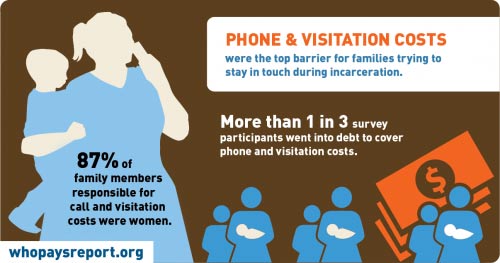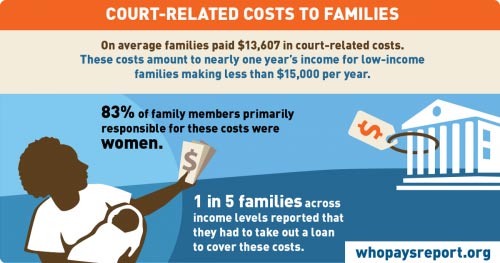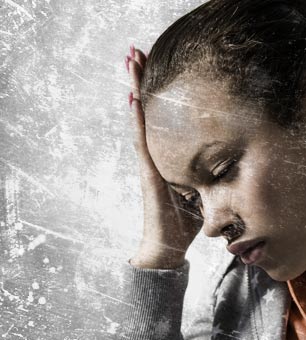There are a number of ways to put a price tag on the United States’s shameful mass incarceration system. On the most superficial level, $80 billion is how much it costs to keep more than 2.4 million people in our jails and prisons. Then there are the costs to those incarcerated themselves, who often find they’re denied basic civil rights and struggle to find employment, education, and housing for years to come after their release.
 But that’s really only the beginning, according to a groundbreaking new report from the Ella Baker Center for Human Rights, Forward Together, and Research Action Design. Surveys of hundreds of formerly incarcerated people and their families in 14 states show that the true costs – emotional and financial – “continue long after incarceration ends and reach far beyond the individual being punished.”
But that’s really only the beginning, according to a groundbreaking new report from the Ella Baker Center for Human Rights, Forward Together, and Research Action Design. Surveys of hundreds of formerly incarcerated people and their families in 14 states show that the true costs – emotional and financial – “continue long after incarceration ends and reach far beyond the individual being punished.”
The findings show that the long-term costs extend beyond the significant sums already paid by individuals and their families for immediate and myriad legal expenses, including cost of attorney, court fees and fines, and phone and visitation charges. In fact, these costs often amount to one year’s total household income for a family and can force a family into debt. Latent costs include, but are not limited to, mental health support, care for untreated physical ailments, the loss of children sent to foster care or extended family, permanent declines in income, and loss of opportunities like education and employment for both the individuals incarcerated and their family members, opportunities that could lead to a brighter future.
As the report emphasizes, it is overwhelming women – particularly low-income women of color, given the race and class bias of our criminal justice system – who shoulder these burdens. A recent study found that 44 percent of Black women and 12 percent of white women have a family member imprisoned, compared with 32 percent of Black men and 6 percent of white men.
 “This study confirms what society has ignored for too long – that already vulnerable families and the women who sustain them are being plummeted into greater poverty, stress, and strain when their loved ones are incarcerated,” said Alicia Walters of Forward Together explained in the report’s release. “Decades of bad policy have torn families apart, typically leaving mothers to make up the difference and bear the brunt of these costs.”
“This study confirms what society has ignored for too long – that already vulnerable families and the women who sustain them are being plummeted into greater poverty, stress, and strain when their loved ones are incarcerated,” said Alicia Walters of Forward Together explained in the report’s release. “Decades of bad policy have torn families apart, typically leaving mothers to make up the difference and bear the brunt of these costs.”
Check out the full report and other key findings, including the groups’ recommendations for policy changes to keep people out of prison in the first place and remove the current barriers to assistance and opportunities upon their re-entry – reforms that will help entire families, communities, and the society at large.
Our most important fundraising appeal of the year
December is the most critical time of year for Truthout, because our nonprofit news is funded almost entirely by individual donations from readers like you. So before you navigate away, we ask that you take just a second to support Truthout with a tax-deductible donation.
This year is a little different. We are up against a far-reaching, wide-scale attack on press freedom coming from the Trump administration. 2025 was a year of frightening censorship, news industry corporate consolidation, and worsening financial conditions for progressive nonprofits across the board.
We can only resist Trump’s agenda by cultivating a strong base of support. The right-wing mediasphere is funded comfortably by billionaire owners and venture capitalist philanthropists. At Truthout, we have you.
We’ve set an ambitious target for our year-end campaign — a goal of $125,000 to keep up our fight against authoritarianism in 2026. Please take a meaningful action in this fight: make a one-time or monthly donation to Truthout before December 31. If you have the means, please dig deep.
